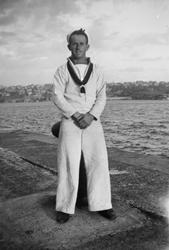 There’s as
much reflection in the going to war as there is in the coming home. And this is how I would like to introduce a
poet I admire and one of
There’s as
much reflection in the going to war as there is in the coming home. And this is how I would like to introduce a
poet I admire and one of
Troop Train Returning
Les Murray (1938 – )
Beyond the Divide
the days become immense,
beyond our war
in the level lands of wheat,
the things that we defended are still here,
the willow-trees pruned neatly cattle-high,
the summer roads where far-back bullock drays
foundered in earth and mouldered into yarns.
From a ringbarked tree, as we go cheering by
a tower and a whirlwind of white birds,
as we speed by
with a whistle for the plains.
On kitbags in the aisle, old terrors doze,
clumsy as rifles in a peacetime train.
Stopped at a siding
under miles of sun,
I watched a friend I mightn’t see again
shyly shake hands, becoming a civilian,
and an old Ford truck
receding to the sky.
I walk about.
The silo, tall as Time,
casts on bright straws its coldly southward
shade.
All things are spaced out here
each in its value.
the pepper-trees beside the crossroads pub
are dim with peace,
pumpkins are stones
in fields so loosely green.
In a little while, I’ll be afraid to look
out for my house and the people that I love,
they have been buried in the moon so long.
Beyond all wars
in the noonday lands of wheat,
the whistle summons shouters from the bar,
refills the train with jokes and window noise.
this perfect plain
casts out the things we’ve done
as we jostle here, relaxed as farmers,
smoking,
held at this siding
till the red clicks green.
My contribution to this post is also written from
imagination – imagination of a young man who went to war from a Queensland Pioneer
Valley
1941, Friday, 3rd January The
Commanding Officer received a telephone communication. All pre-embarkation leave must be completed
by the 21st January
They sent
Fred and me home on leave
together,
five
days, two days
travel
time,
I went
to visit mum and dad’s grave
before
taking the rail motor to Finch Hatton,
looked
so forward to catching up,
me in
my dress uniform,
and the
world beyond
cane
paddocks and scrub,
never
realized before,
how
warm feeling,
distant
kerosene
lamp glow gives,
at
night from a farm window,
far
off,
seems
out of touch now,
comfortable
and beckoning,
but
regretful,
when
you know the true brightness.
After
only a day
I was
eager to get back,
Jess
and Rachael talked into the night,
Steve
doesn’t understand
or
George
I think
May was proud of me,
the
night stayed at their place
on the
Gargett farm,
poor
Les itching to get into it,
said my final good-byes.....
J. O. White


